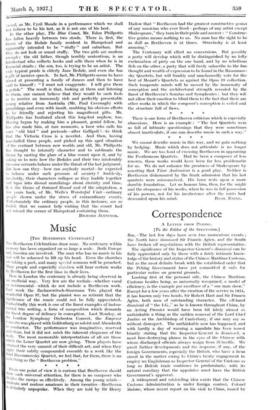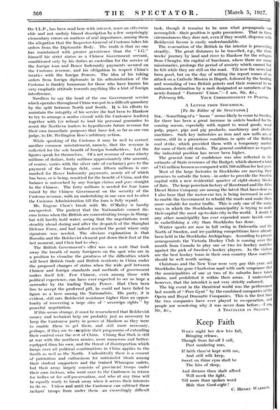Correspondence
[To the Editor of the SPECTATOR.] Slit,—The last few days have seen two momentous events ; the North have dismissed Sir Francis Aglen, and the South have broken off negotiations with the British representative.
The significance of the Inspector-General's dismissal can be fully appreciated only by those with a fairly intimate know- ledge of the history and status of the Chinese Maritime Customs, but as the most definite break with the established order that the Peking Government have yet committed it calls for particular notice on general grounds.
Looking first at the personal side, the Chinese Maritime Customs besides being, as universally recognized, a model of efficiency, is the example par excellence of a " one man show." Except for a few years after the creation of the service in 1854, it has known only two heads, Sir Robert Hart and Sir Francis Aglen, both men of outstanding character. The off-hand dismissal of " the I.G.," as he is known throughout China, by an Acting Premier would have been till lately almost as unthinkable a thing as the sudden removal of the Lord Chief Justice or the Archbishop of Canterbury, if one may say so without disrespect. The unthinkable now has happened, and with hardly a day of warning a mandate has been issued bluntly stating that the Inspector-General is dismissed, a most face-destroying phrase in the eyes of the Chinese with whom discharged officials always resign from ill-health. We await further developments and the response, if any, of the foreign Governments, especially the British, who have a locus standi in the matter owing to China's treaty engagement to employ an Englishman as Inspector-General of the Customs so long as British trade continues to predominate, with its natural corollary that the appointee must have the British Government's approval.
A widespread and misleading idea exists that the Chinese Customs Administration is under foreign control. Colonel Malone, whose recent report on his visit to aims, issued by the I.L.P., has been read here with interest, mars an otherwise able and not unduly biased description by a few surprisingly elementary errors on matters of real importance; among therin the allegation that the Inspector-General of Customs takes his orders from the Diplomatic Body. The truth is that no one has maintained with greater persistence than the " I.G." himself his strict status as a Chinese Government servant, conditioned only by his duties as custodian for the service of the foreign loan and Boxer Indemnity payments secured on the Customs revenue, and his obligation to respect China's treaties with the foreign Powers. The idea of his taking orders from foreign diplomats in his administration of the Customs is frankly humorous for those who have known his very emphatic attitude towards anything like a hint of foreign interference.
• Needless to say the head of the one Government service which operates throughout China was put in a difficult quandary -by the split between North and South. It is his efforts to maintain the integrity of his service (he had been to Hankow to try to arrange a modus virendi with the Cantonese leaders) together with his refusal to lend his personal guarantee to assist the Northern leaders to hypothecate future revenue for their own immediate purposes that have led, so far as one can judge, to Dr. Wellington Koo's arbitrary action.
While speaking of the Customs it may be well to correct another common misstatement, namely, that the revenue is collected for the sole benefit of foreign bondholders. Let the figures speak for themselves. Of a net revenue of some ninety millions of dollars, forty millions approximately (the amount, of course, varies with the silver rate of exchange) goes to the payment of the foreign debt, some fifteen millions is ear- -marked for -Boxer Indemnity payments, nearly all of which has been, or is being, remitted for the benefit of China, and the balance is untouched by any foreign claims and goes straight to the Chinese. The forty millions is needed for four loans raised by the Chinese Government on the security of the Customs revenue, with an undertaking in one case not to alter the Customs Administration till the loan is fully repaid.
Mr. Eugene Chen's break with Mr. O'Malley is hardly unexpected. The pretext that the Nationalists cannot dis- cuss terms when the British arc concentrating troops in Shang- hai will hardly hold water, seeing that the negotiations went steadily ahead during and after the despatch of the Shanghai Defence Force, and had indeed reached the point where only signature was needed. The obvious explanation is that Borodin and the Bolshevist element put down their foot at the last moment, and Chen had to obey.
• The British Government's offer was on a scale that took away the breath of many foreigners on the spot who are in a position to visualize the greatness of the difficulties which will beset British trade and British residents in China under the proposed changes of status when the wide gulf between Chinese and foreign standards and methods of government makes itself felt. Few Chinese, even among those with political experience, can have ever expected to see so large a surrender by the leading Treaty Power. Had Chen been free to accept the proferred gift, he could not have failed to figure as a hero among the Nationalists. His party, it is evident, still rate Bolshevist assistance higher than an oppor- tunity of recovering a large slice of " sovereign rights " by peaceful negotiation.
If this seems strange, it must be remembered that .Bolshevist money and technical help are probably just as necessary to keep the Cantonese party in power at Hankow as they were to enable them to get there, and still more necessary, perhaps, if they are to cetylete their programme of extending their control over the rest of China. Chiang Kai Shek is still at war with the northern armies, more numerous and better- equtpped than his own, and the threat of disintegration which hangs over all political combinations in China applies to the South as well as the North. Undoubtedly there is a cement of patriotism and enthusiasm for nationalist ideals among their student supporters and the trained Whampoa cadets, but their army largely consists of provincial troops under
their own tut-buns, who went over to the Cantonese in return for bribes or for self-preservation, and who at any time will be equally ready to break away when it serves their interests to do so. Unless and until the Cantonese can subtract these Itechuns' troops from under them—an exceedingly difficult task, though it remains to be seen what propaganda can accomplish—their position is quite precarious. That in these circumstances they dare not, even if they would, dispense with Bolshevist favour is easily understandable.
The evacuation of the British in the interior is proceeding steadily. The great distances to be travelled, e.g., the three weeks' journey by land and river to Hankow for the refugee, from Chengtu, the capital of Szechuan, where there are many missionaries, prolongs the period of anxiety which cannot but be felt while they are still on the road. Till now the news bad been good, but on the day of writing the report comes of an attack on a Catholic Mission in Hupeh, followed by the beating and wounding of two British priests and their removal to an unknown destination by a mob designated as members of the newly-formed " Farmers' Union."—I am, Sir, &e., February 6Th. YOUR CORRESPONDENT IN. PEKING.































































 Previous page
Previous page